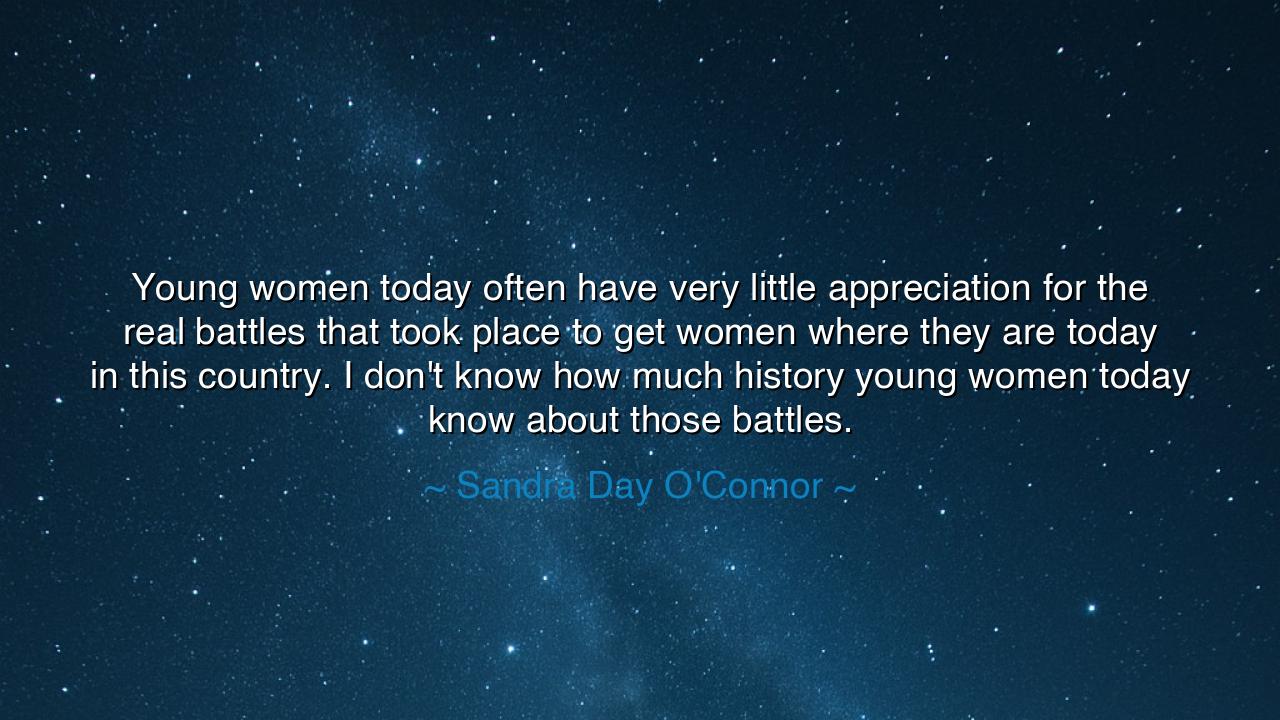
Young women today often have very little appreciation for the
Young women today often have very little appreciation for the real battles that took place to get women where they are today in this country. I don't know how much history young women today know about those battles.






“Young women today often have very little appreciation for the real battles that took place to get women where they are today in this country. I don't know how much history young women today know about those battles,” spoke Sandra Day O’Connor, the first woman to serve on the United States Supreme Court—a voice forged in wisdom, tempered by struggle, and rooted in the long, painful march toward equality. Her words are not a rebuke, but a lamentation; not an accusation, but a warning. They are the voice of one who has seen how easily comfort breeds forgetfulness, and how swiftly the blessings of freedom can wither when their roots are no longer honored.
In this quote, O’Connor calls upon the living to remember the price of progress. For every right enjoyed by women today—every vote cast, every office held, every voice heard in court or council—there lies beneath it the blood, sweat, and tears of those who came before. The road to equality was not laid with ease or generosity; it was built through resistance, ridicule, and relentless perseverance. O’Connor reminds us that history is not an ornament to admire—it is a mirror, showing us the courage we must sustain if we wish to preserve what has been gained.
Think of the women of old who fought when the world called them unfit to fight. Susan B. Anthony, Sojourner Truth, Elizabeth Cady Stanton—these were not names carved in marble in their own time, but voices of defiance, often despised and dismissed. They faced jeers, imprisonment, and scorn, yet still they pressed forward, demanding that a woman’s mind, heart, and will be recognized as equal in the sight of law and God. Their battles were not of swords and shields, but of petitions, speeches, and tireless marches—wars of spirit fought in the streets and in the courts, where silence itself was the enemy.
O’Connor, having herself broken through the granite wall of judicial tradition, knew that her place on the bench was built upon those same invisible foundations—the legacy of women who had fought long before her for education, opportunity, and respect. She understood that forgetting history is the first step toward losing its lessons. For when the young no longer remember the battles of the past, they risk taking for granted the rights that were once denied, assuming that equality is as natural as air, rather than as fragile as glass.
History shows us this truth again and again. When the women’s suffrage movement triumphed with the ratification of the 19th Amendment in 1920, many thought the war for equality had ended. But history had only changed its form. Decades later, women would fight anew—for fair wages, for legal recognition, for the right to stand in places once barred to them. Each generation has had to fight its own battle, for freedom is not inherited—it must be defended. And when that defense weakens, the shadows of the past creep silently back.
Thus, O’Connor’s words are a summons—a call to awaken the memory of courage in a time grown too quiet. She warns against complacency, that subtle decay which eats away at the foundations of progress. For if the young forget the struggle, they will not see the storm gathering again on the horizon. To remember is not merely to honor—it is to arm oneself with wisdom. Knowledge of history is the shield that guards against the return of injustice.
So let every young woman, and every man who values truth, take O’Connor’s words as a sacred charge: learn the history that gave you freedom. Seek the stories of those who walked through fire so that you could stand in the light. Study their strength, honor their sacrifice, and carry their flame forward. For the day we forget our battles is the day we invite them to begin again.
And thus, let this truth be passed down as a torch through the ages: rights without remembrance are rights without roots. Water them with gratitude, strengthen them with understanding, and protect them with vigilance. Only then will the garden of equality continue to bloom—for as O’Connor reminds us, no victory in justice is ever final, and no freedom ever secure unless the next generation remembers how it was won.






AAdministratorAdministrator
Welcome, honored guests. Please leave a comment, we will respond soon